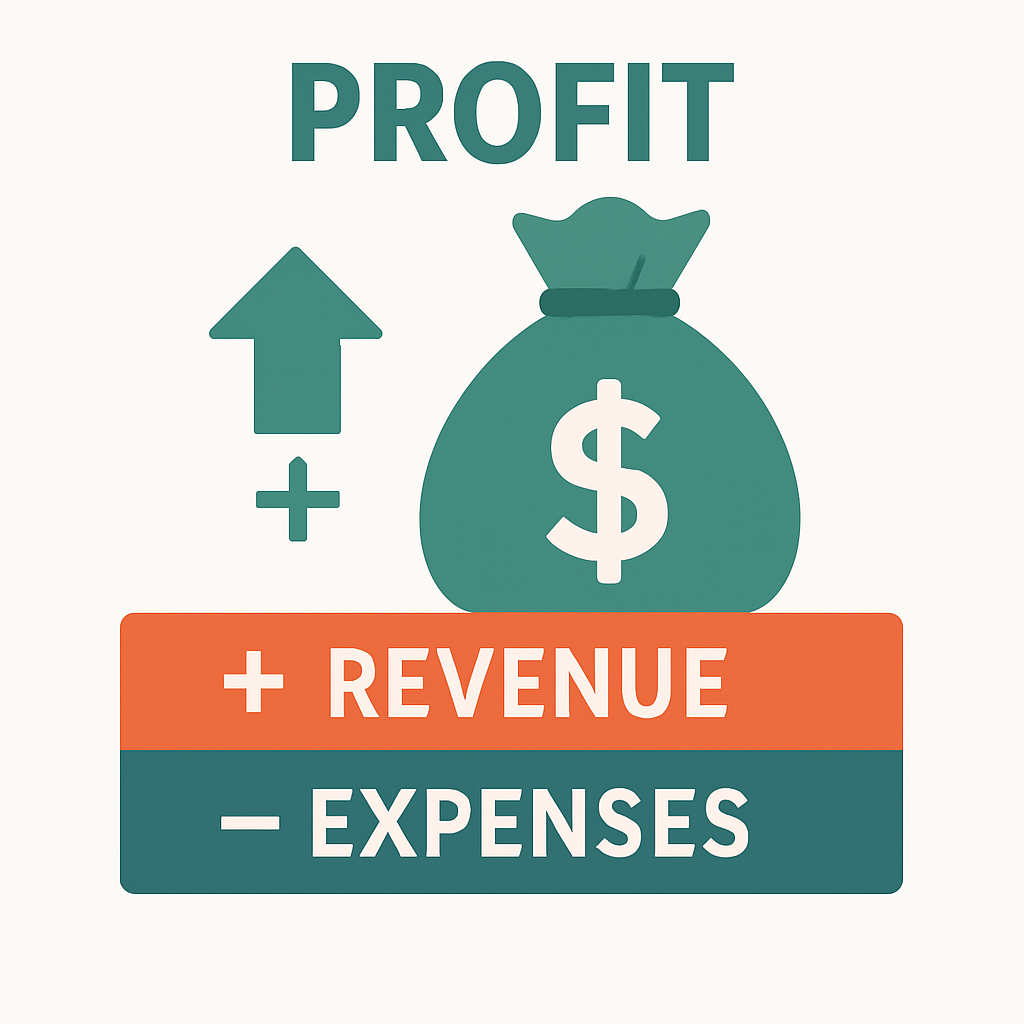Profit
Definition
The term "profit" describes the financial gain obtained when revenue exceeds expenses, or an advantage or benefit gained from an activity.
Parts of Speech
- Noun
- Verb
Pronunciation
American English
- IPA Pronunciation: /ˈprɑː.fɪt/
- Respelling: PRAH-fit
British English
- IPA Pronunciation: /ˈprɒ.fɪt/
- Respelling: PRO-fit
Etymology
The word "profit" originates from the Latin "proficere," meaning "to advance or benefit," via Old French "profit," which referred to benefit, income, or advantage. It entered Middle English with financial and general positive connotations.
Derivatives
- Profitable (adjective)
- Profitability (noun)
- Profiteer (noun, verb)
- Profitless (adjective)
- Profiting (verb)
Synonyms
- Gain
- Earnings
- Benefit
Antonyms
- Loss
- Deficit
- Debt
Usage
The term "profit" is widely used in business, finance, and personal contexts. For example, "The company reported a significant profit this quarter" or "He profited from his years of experience in the field."
Related Terms
- Revenue: Income generated from goods or services.
- Margin: The difference between cost and selling price.
- Investment: The act of allocating resources for potential gain.
Detailed Definitions
Noun
- Financial gain: Refers to the surplus remaining after expenses are deducted from revenue.
- Example: "The company’s annual profit increased by 20%."
- Advantage or benefit: Refers to a gain or improvement derived from an activity or situation.
- Example: "She gained great profit from her education."
Verb
- To gain financially: Refers to earning a surplus or monetary benefit.
- Example: "The investors profited from the booming stock market."
- To benefit or advance: Refers to gaining advantage or improvement from a situation.
- Example: "She profited greatly from the mentorship program."
profit



🇨🇳 Mandarin
- 利润 (Financial Profit): Lìrùn
- IPA Pronunciation: /li˥˥ ʐwən˥˥/
- Respelling in English: Li-run
- 收益 (Benefit, gain): Shōuyì
- IPA Pronunciation: /ʂoʊ˥˩ i˥˥/
- Respelling in English: Sho-yi
🇮🇳 Hindi
- लाभ (Financial Profit): Lābh
- IPA Pronunciation: /lɑːbʱ/
- Respelling in English: La-bh
- फ़ायदा (Benefit, advantage): Fāyadā
- IPA Pronunciation: /fɑːjəd̪aː/
- Respelling in English: Fa-ya-da
🇪🇸 Spanish
- Ganancia (Financial Profit)
- IPA Pronunciation: /ɡaˈnant͡sja/
- Respelling in English: Ga-nan-cia
- Beneficio (Benefit, gain)
- IPA Pronunciation: /beneˈfiθjo/
- Respelling in English: Be-ne-fi-thio
🇫🇷 French
- Profit (Financial Profit)
- IPA Pronunciation: /pʁɔfi/
- Respelling in English: Pro-fit
- Bénéfice (Benefit, gain)
- IPA Pronunciation: /benefis/
- Respelling in English: Be-ne-fis
🇸🇦 Modern Standard Arabic
- ربح (Financial Profit): Rabḥ
- IPA Pronunciation: /rɑbħ/
- Respelling in English: Rabh
- فائدة (Benefit, advantage): Fā'ida
- IPA Pronunciation: /fɑːʔɪdɐ/
- Respelling in English: Fa-i-da
🇧🇩 Bengali
- লাভ (Financial Profit): Lābh
- IPA Pronunciation: /lɑːbʱ/
- Respelling in English: La-bh
- উপকার (Benefit, advantage): Upakār
- IPA Pronunciation: /upoːkaːr/
- Respelling in English: U-po-kar
🇷🇺 Russian
- Прибыль (Financial Profit): Pribyl'
- IPA Pronunciation: /ˈprʲibɨlʲ/
- Respelling in English: Pree-byl'
- Выгода (Benefit, advantage): Vyigoda
- IPA Pronunciation: /ˈvɨɡədə/
- Respelling in English: Vee-go-da
🇵🇹 Portuguese
- Lucro (Financial Profit)
- IPA Pronunciation: /ˈlukɾu/
- Respelling in English: Lu-kro
- Benefício (Benefit, gain)
- IPA Pronunciation: /bẽeˈfisiu/
- Respelling in English: Be-ne-fi-sio
🇮🇩 Indonesian
- Keuntungan (Financial Profit)
- IPA Pronunciation: /kəʊnˈtʊŋan/
- Respelling in English: Ke-un-tun-gan
- Manfaat (Benefit, advantage)
- IPA Pronunciation: /manfaʔat/
- Respelling in English: Man-fa-at
🇩🇪 German
- Gewinn (Financial Profit)
- IPA Pronunciation: /ɡəˈvɪn/
- Respelling in English: Ge-vinn
- Nutzen (Benefit, gain)
- IPA Pronunciation: /ˈnʊtsən/
- Respelling in English: Nut-zen
🇯🇵 Japanese
- 利益 (Financial Profit): Rieki
- IPA Pronunciation: /ɾʲiekʲi/
- Respelling in English: Ri-e-ki
- 得 (Benefit, gain): Toku
- IPA Pronunciation: /toku/
- Respelling in English: To-ku
🇻🇳 Vietnamese
- Lợi nhuận (Financial Profit)
- IPA Pronunciation: /ləːj ɲwəːn˧ˀ˨ʔ/
- Respelling in English: Loi nhuan
- Lợi ích (Benefit, gain)
- IPA Pronunciation: /ləːj ik˧ˀ˨ʔ/
- Respelling in English: Loi ich
🇰🇷 Korean
- 이익 (Financial Profit): Iik
- IPA Pronunciation: /iːk/
- Respelling in English: I-eek
- 이득 (Benefit, gain): Ideug
- IPA Pronunciation: /idʌk/
- Respelling in English: I-deug
🇹🇷 Turkish
- Kar (Financial Profit)
- IPA Pronunciation: /kaɾ/
- Respelling in English: Kar
- Fayda (Benefit, advantage)
- IPA Pronunciation: /fajda/
- Respelling in English: Fay-da
🇵🇰 Urdu
- منافع (Financial Profit): Munāfa
- IPA Pronunciation: /mʊˈnɑːfə/
- Respelling in English: Mu-na-fa
- فائدہ (Benefit, advantage): Fā'ida
- IPA Pronunciation: /fɑːɪdə/
- Respelling in English: Fa-i-da





